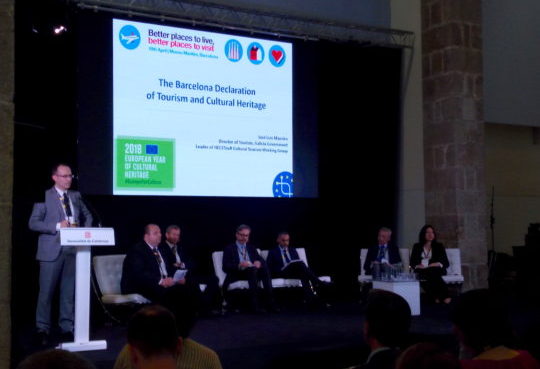The creation of synergies between cultural heritage and tourism for sustainable development has been the main topic of the workshop “Better Places to Live, Better Places to Visit” organised by NECSTouR (Network of European Regions for Sustainable and Competitive Tourism) and the Catalan Government at the Museu Marítim in Barcelona on 19 April 2018, in the framework of 2018 European Year of Cultural Heritage.
IGCAT attended the event that, under the aim “Stakeholder engagement for Sustainable Tourism: Balancing Culture, Society and Businesses,” brought together around 350 representatives from the public, private and third sectors and prominent experts from the cultural and tourism fields coming from 12 European countries, together with representatives from the European Commission, the European Committee of the Regions, UNESCO and UNWTO.
The workshop fostered a dialogue between all the stakeholders involved in the tourism and cultural heritage sectors with the objective of exchanging knowledge and best practices to identify opportunities and find innovative solutions to current challenges affecting European destinations, such as unbalanced tourism, massification, lack of tourism management and loss of authenticity.
The event culminated with the presentation of the Barcelona Declaration on Tourism and Cultural Heritage, an open document collecting principles, recommendations and actions for tourism destinations and stakeholders to promote sustainable approaches to tourism and cultural heritage. The Declaration is based on five main principles: Smart and inclusive management; Generate sense of place and pride; Holistic vision of the marketing promotion and preservation; Balance place, people and business; and Connect from people to people.
President of NECSTouR and General Director for Tourism of the Catalan Government, Octavi Bono summarised the workshop’s outcomes stating that: “We acknowledged that tourism is source of innovation, urban generation, investment, intercultural dialogue, and social experience. However, it has also been pointed out how the lack of integrated management and joint vision on the opportunities of tourism is a key challenge not only for business development but also for generating added value and pride. Consequently, to build together a desired and well-balanced destination, we claim for a holistic approach, involving all the new players in this discussion – such as the innovation players and the digital platforms – and all the stakeholders – private, public, academics from different related fields, and young people, as the future of the European destinations.»
The workshop strengthened the commitment of NECSTouR and its members to the implementation of a Sustainable Tourism Policy in Europe and the achievement of the Sustainable Development Goals related to tourism included in the United Nations’ Agenda 2030.
23 abril 2018
